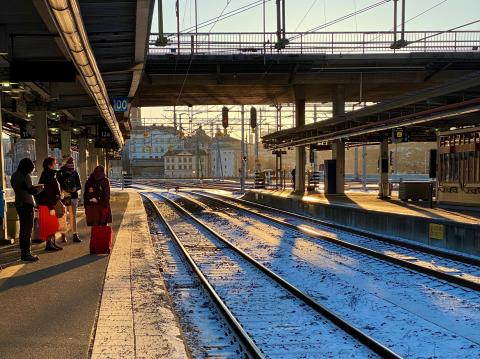Article highlighted
Train traffic can become more punctual – here’s how

Too many of those who traveled by train in Sweden this year have suffered from canceled or delayed journeys. The share of trains that has been canceled or delayed during the first half of this year is the highest in ten years, says Carl-William Palmqvist, who is a researcher at K2 and Lund University.
– To improve the punctuality of trains, quality improvement work must be systematized and intensified in the areas of technology, maintenance, timetables and on providing better information for travelers. There are several concrete and relatively simple measures, such as providing travelers with information about where on the platform they should wait to quickly reach their seat on the train, says Carl-William Palmqvist.
Most delays are caused by small disruptions, up to a few minutes. Several such disturbances, however, can cause a significant delay over a longer journey.
– The current timetables systematically underestimate how much time is required at each stop for travelers to get on and off the train, says Carl-William.
Lack of maintenance work
Many of the cancelled or delayed trains this year have been affected by track works, both planned maintenance and emergency interventions.
– The maintenance of the railway, both the infrastructure and rolling stock, has been insufficient for many years but is now happening at a higher pace. This means that trains are now affected both by frequent failures in the infrastructure, and by extensive maintenance works, says Carl-William Palmqvist.
– The service windows for planned maintenance work are poorly utilized, and so the maintenance work is often carried out during times when trains should run. Frequent emergency interventions naturally make planning difficult, but it seems that the contractors who carry out the maintenance work lack sufficient incentives to carry out the work at times that do not affect traffic, Carl-William continues.
Make use of the railway's capacity
Punctuality of rail traffic is often the single most important factor for how satisfied travelers are with their journey. Punctuality also affects the extent to which it is possible to make use of the railway's full capacity.
– The frequent delays are one reason that we cannot operate as many trains as we would like, and improving punctuality is one important way to make room for more trains, Carl-William Palmqvist concludes.
Contact:
Carl-William Palmqvist, researcher at K2 and the Faculty of Engineering at Lund University.
E-mail: carl-william.palmqvist@tft.lth.se
Telephone: +46 79 062 13 78
